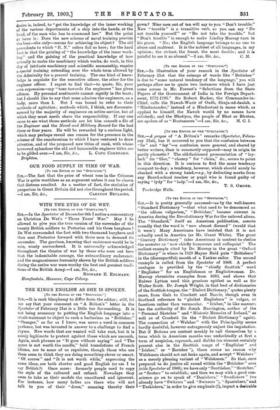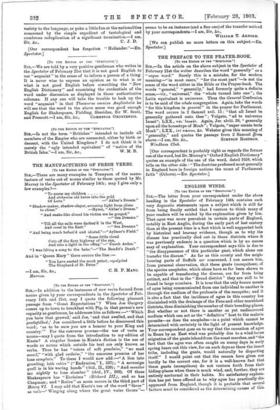pro TEE EDITOR OP THE " SPFCTATOR*"1 SIR, —It is pretty
generally assumed—as by the well-known "Standard Dictionary "—that what used to be denounced as " the odious vulgarism," " Britisher," became current in America during the Revolutionary War for the unloved aliens. The "Standard," itself an American publication, asserts roundly that the word is " now almost disused " (would that it were !) Many Americans have insisted that it is not actually used in America (as Mr. Grant White). The great "Century Dictionary" (also American) is content to obelise the monster as " now chiefly humorous and colloquial." The earliest example cited by Dr. Murray in the great " Oxford Dictionary" is where in 1829 Mayne Reid puts "Britishers " in the (disrespectful) mouth of a Yankee sailor. The second example is culled from the Spectator of 1868. A perfect analogue is provided by the "chiefly Scottish" word " Englisher " for an Englishman or Englishwoman. Dr. Murray chronicles examples from 1683, and shows that Bulwer Lytton used this gracious epithet as well as Sir Walter Scott. Dr. Joseph Wright, in that best of dictionaries of the Scottish tongue, the " Dialect Dictionary," quotes plenty more, from Galt to Crockett and Barrie, though even in Scotland reference to " glaiket Englishers" is vulgar, or facetious rather than vernacular. " Irisher," in like manner, has the authority of Sir Jonah Barrington, author of the " Personal Sketches " and " Historic Memoirs of Ireland," as well as of Crockett (in the " Dialect Dictionary" again). The connection of " Welsher" with the Principality seems hardly doubtful, however outrageously unjust the imputation. But if Britons are content meekly to call themselves by a term which in American mouths was undoubtedly at first a term of suspicion, reproach, and dislike (an element certainly present also in the Scottish usage of " Enedisher " and " Irisher," or " Eerisher "), there seems no reason why Welshmen should not eat leeks again, and accept " Welshers " as a merely pleasing variant of " Welshmen." So that, once prepared to do justice all round within the "Britisher" area (vide Spectator of 1868), we have only " Scottisher," "Scotcher," or "Scotser " to establish; and then we may with a good con- science go on to speak of " Danishers," " Swedishers (we already have " Switzers " and " Swissers "), " Spaniahers," and " Turkishers," in order to give emphasis (?), impart a desirable
variety to the language, or poke a little fun at the nationalities concerned by the simple expedient of tautological and cumbrous reduplication of a significant termination.—I am, [Our correspondent has forgotten " Hollander."—En. Spectator.]











































 Previous page
Previous page